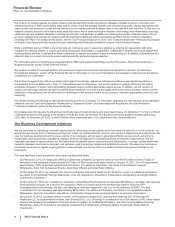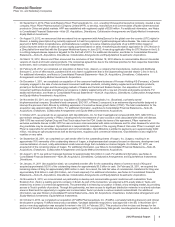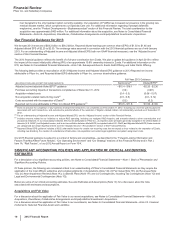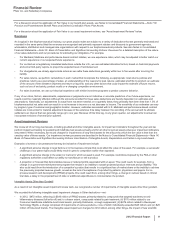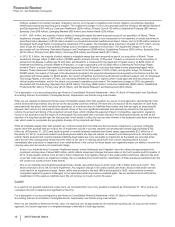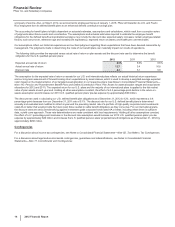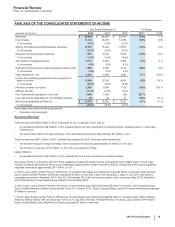Pfizer 2012 Annual Report Download - page 19
Download and view the complete annual report
Please find page 19 of the 2012 Pfizer annual report below. You can navigate through the pages in the report by either clicking on the pages listed below, or by using the keyword search tool below to find specific information within the annual report.
Financial Review
Pfizer Inc. and Subsidiary Companies
18
2012 Financial Report
• in our international markets, revenues from biopharmaceutical products decreased 7% in 2012, compared to 2011, primarily due to the
loss of exclusivity of Lipitor in most of developed Europe and the unfavorable impact of foreign exchange of 3%. Operationally, revenues
decreased 4% in 2012, compared to 2011. In addition to Lipitor, the decrease in operational revenues was driven by Xalatan/Xalacom,
Aricept and Aromasin, all due to loss of exclusivity in certain markets, as well as lower Alliance revenues, primarily due to the loss of
exclusivity of Aricept in many major European markets, and lower revenues for Spiriva in certain European countries, Canada and
Australia (reflecting the final-year terms of our Spiriva collaboration agreements relating to those countries), as well as lower revenues for
Norvasc and Effexor. The impact of these adverse factors was partially offset by the strong operational growth of Lyrica, Prevnar 13/
Prevenar 13 and Enbrel.
During 2012, international revenues from biopharmaceutical products represented 62% of total revenues from biopharmaceutical products,
compared to 59% in 2011.
Primary Care Operating Segment
• Primary Care unit revenues decreased 31% in 2012 compared to 2011, reflecting lower operational revenues of 30%, primarily due to the
losses of exclusivity of Lipitor in most major markets, as well as the resulting shift in the reporting of U.S. and Japan Lipitor revenues to
the Established Products unit beginning January 1, 2012. These factors impacted Primary Care operational revenues by approximately
$5.6 billion, or 25%, in 2012.
Collectively, the decline in worldwide revenues for Lipitor and for certain other Primary Care unit products that lost exclusivity in various
markets in 2012 and 2011, as well as the resulting shift in the reporting of certain product revenues to the Established Products unit,
reduced Primary Care unit revenues by $7.9 billion, or 35%, in comparison with 2011.
The impact of these declines was slightly offset by the strong operational growth of Lyrica in developed markets and Celebrex and Viagra
in the U.S.
Specialty Care and Oncology Operating Segment
• Specialty Care unit revenues decreased 7% compared to 2011, due to lower operational revenues of 5%, as well as the adverse impact
of foreign exchange. Operational revenues were negatively impacted by the decline in the Prevnar/Prevenar family in the U.S. and
developed Europe, as the pediatric catch-up dose opportunity declined significantly in 2012 compared to 2011, with fewer children eligible
to receive the catch-up dose. Additionally, utilization of Prevnar/Prevenar in older adults remains modest at this time.
Specialty Care unit revenues were also unfavorably impacted by the losses of exclusivity of Vfend and Xalatan in the U.S. in February
and March 2011, respectively, and the resulting shift in the reporting of Vfend and Xalatan U.S. revenues to the Established Products unit
beginning January 1, 2012, as well as the loss of exclusivity of Xalatan and Xalacom in the majority of European markets in January
2012, and Geodon in the U.S. in March 2012. Collectively, these developments reduced Specialty Care unit revenues by $1.1 billion, or
7%, in comparison with 2011.
Operational revenues were favorably impacted by the growth of Benefix, Rebif, ReFacto/Xyntha, Enbrel and Zyvox.
• Oncology unit revenues decreased 1%, compared to 2011, primarily due to the unfavorable impact of foreign exchange of 3%.
Operational revenues were positively impacted by the launches of Inlyta and Xalkori in the U.S. and certain other developed markets,
partially offset by the unfavorable impact of the loss of exclusivity of Aromasin in the majority of European markets in the second half of
2011 and the resulting shift in the reporting of such revenues to the Established Products unit beginning January 1, 2012. This loss of
exclusivity reduced Oncology unit revenues by $229 million, or 17%, in comparison with 2011.
Operational revenues were also favorably impacted by the growth of Sutent, primarily in the U.S. and emerging markets.
Established Products and Emerging Markets Operating Segment
• Established Products unit revenues increased 11% compared to 2011, due to higher operational revenues of 13%, partially offset by a
2% unfavorable impact of foreign exchange. The increase in Established Products unit operational revenues in 2012 was mainly due to
the shift in the reporting of branded Lipitor revenues in the U.S. and Japan from the Primary Care unit, totaling $1.4 billion, to the
Established Products unit beginning January 1, 2012, as well as recent launches of generic versions of certain Pfizer branded primary
care and specialty care products, and by contributions from the sales of the authorized generic version of Lipitor in the U.S. by Watson
Pharmaceuticals, Inc. (Watson). The agreement with Watson was terminated by mutual consent in January 2013.
Operational revenues were unfavorably impacted by the entry of multi-source generic competition in the U.S. for donepezil (Aricept) in
May 2011, as well as the continuing decline of revenues of certain products that previously lost exclusivity and the impact of ongoing
pricing pressures, primarily in South Korea and developed Europe.
• Emerging Markets unit revenues increased 7% compared to 2011, due to higher operational revenues of 12%, partially offset by a 5%
unfavorable impact of foreign exchange. The increase in Emerging Markets unit operational revenues in 2012 was primarily due to
volume growth in China, Brazil and Russia, as a result of more targeted promotional efforts for key innovative and established products,
including Lipitor, Norvasc and Lyrica.
Total revenues from established products in both the Established Products and Emerging Markets units were $14.4 billion, with $4.2 billion
generated in emerging markets in 2012.


